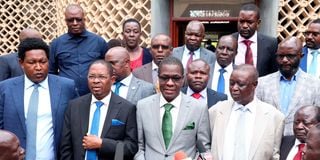Premium
Azimio MPs vow to resist plan to sack civil servants

MPs led by National Assembly Minority Leader Opiyo Wandayi and his Senate counterpart Stewart Madzayo (front: second left) address the media at Parliament Buildings on March 22, 2023.
The Opposition has vowed to resist any plan to retrench civil servants even as it demanded an independent probe into the Kenya Kwanza government’s spending amid a financial crisis in the country.
“No civil servant is going to be retrenched while [President] Ruto is busy hiring CASs [chief administrative secretaries] and other personnel the country doesn’t need. Not under our watch,” said National Assembly Leader of Minority Opiyo Wandayi (Ugunja) yesterday.
Dr David Ndii, chair of President Ruto’s Council of Economic Advisors, recently hinted at plans to send civil servants packing, tweeting on April 8: “We could also retrench. That’s an option”.
The Azimio la Umoja One Kenya Coalition Party also lobbied a committee of legislators and finance experts to urgently examine the government’s expenditure, administration and policies that have plunged the country into a financial crisis leading to delayed payment of salaries for government workers, including MPs.
Mr Wandayi and his deputy Robert Mbui (Kathiani) maintained that Kenyans “can’t and won’t” tighten their belts any more. They singled out National Treasury and Kenya Revenue Authority (KRA) for blame over the financial crisis.
“We believe that this near collapse of our financial sector is exacerbated by high government non-priority spending, high taxes that have hurt businesses, massive loan obligations to China, a weakening shilling and foreign exchange reserves at their lowest levels ever,” said Mr Wandayi.
Dr Ndii had blamed Kenya’s financial woes on matured Chinese loans.
“How Chinese loans stopped KRA from meeting its revenue targets, only [Dr] Ndii knows,” said Mr Wandayi, adding: “National Treasury Cabinet Secretary Njuguna Ndung’u and his PS Dr Chris Kiptoo have merely confirmed what we already know — that the situation is bad and Kenyans should tighten their belts.”
KRA maintains it has met over 95 per cent of its revenue targets and is looking forward to recording a surplus by June.
In the financial year ending June, the country targets to collect Sh2.1 trillion as tax revenues.
KRA shortfall
KRA had collected Sh1.2 trillion as at the end of February, leading to a shortfall of about Sh900 billion “that is not realistically achievable within the remaining two months.”
The fears by Azimio are further worsened by the “serious waning of trust in government securities”
The coalition claimed Treasury plans to borrow Sh1.04 trillion from the domestic market in the current financial year.
But Central Bank of Kenya (CBK) records show that the government has managed to raise only a paltry Sh333 billion as at the end of February 2023, leading to a shortfall of approximately Sh707 billion.
The Ruto administration has often claimed that it inherited huge foreign debts when it came into office in September 2022, which has been met with derision by the Opposition.
“Is it the regime’s policy to fix a hole by digging another hole? If the administration has cash flow problems, why is it living large instead of living within its means?” Mr Wandayi posed.
The country’s debt stock stands at Sh9.2 trillion as of February this year against a ceiling of Sh10 trillion enacted in May last year.
“We want a firm guarantee from this regime that the bad apples within its ranks are not creating grounds for the printing of money to fund salaries for government workers, curry favour with the military and pay political opponents,” said Mr Wandayi.
This came as it emerged that the approved budget for the current financial year of Sh715 billion was drastically halved to Sh393 billion under Supplementary Budget I for FY 2022/23.
The MPs noted that, despite this “serious” cut, only Sh162.5 billion has been released to some government ministries, departments and agencies.





